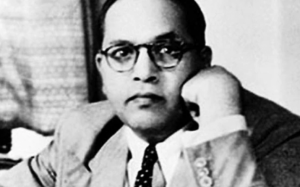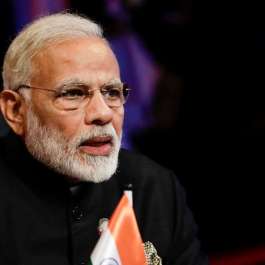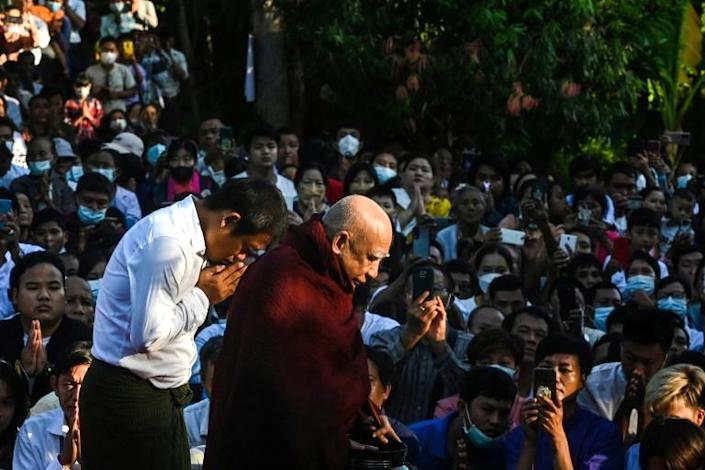
Maha Bodhi Myaing Sayadaw, an 80-year-old Buddhist monk in northern Myanmar’s Sagaing Region, has emerged as a quiet figure of hope and stability for the people of this Southeast Asian nation, who continue to live in fear amid more than eight months of turmoil since the elected government of Aung San Suu Kyi was overthrown in a military-led coup.
In more peaceful times, small groups of Buddhist followers would gather early each morning to offer alms to the revered monk. More recently, the number of people gathering has mushroomed, with growing crowds seeking a glimpse of Maha Bodhi Myaing Sayadaw, in the belief that his presence represents respite from the “three catastrophes” that have befallen Myanmar: the military coup, the COVID-19 pandemic, and a national economy crumbling under the weight of months of civil unrest.
“I came here to worship Sayadaw because . . . he likes to offer the people peace and stability,” said 40-year-old housewife Khaing Thiri Tun, who reportely drove five hours from the city of Mandalay to visit the monk at Nyeyadham, his small monastery. (Burma News International)
In the wake of the coup in February, the junta has consolidated its hold on power with a violent crackdown on public dissent and street demonstrations—which continue on a limited scale in defiance of military-led suppression. Even the country’s venerated monastic sangha have found themselves in the military’s crosshairs, with at least 23 monks taken into custody, some of whom have reportedly been tortured.
Some Burmese Buddhist believe that Maha Bodhi Myaing Sayadaw’s recent re-emergence at the beginning of the vassa rains retreat has brought peace to the area, amid escalating violence between the military and anti-coup rebels elsewhere in Sagaing Region, which has seen some of the bloodiest fighting this year.
“Our region is stable when Sayadaw* receives the pilgrims,” Kaythi, 35, was quoted as saying. (Burma News International) Amid the growing influx of pilgrims, Kaythi has been working as a motorcycle taxi driver, bringing visitors to Nyeyadham Monastery.
Buddhist monastics, venerated throughout Burmese society, are highly influential in Myanmar (formerly Burma), a predominantly Theravada Buddhist country in which 88 per cent of the population of roughly 60 million people identify as Buddhists, according to 2014 census data. Buddhist monastics stood at the forefront of pro-democracy protests against the previous military junta in 2007, a movement known as the Saffron Revolution, which helped to bolster grassroots support. Buddhist monks are estimated to number in excess of 500,000, mainly centered in and around the cities of Yangon and Mandalay, along with some 75,000 Buddhist nuns.
“Sayadaw hasn’t said anything about the political situation,” said Khin Maung Win, one of the monk’s close followers who supervises the morning audiences. “He’s serving his religious duty.” (Burma News International)
“Sayadaw must have his reason for receiving pilgrims,” said Moe Moe Lwin, another visitor from Mandalay. “He’s appeared in front of people so they can feel peaceful and free from danger.” (Burma News International)
Myanmar’s military declared a year-long state of emergency on 1 February, after detaining President Win Myint, State Counselor Aung San Suu Kyi, and other members of the governing National League for Democracy (NLD) party. The coup d’état took place just hours before the country’s new parliament was due to convene following a general election in November last year, during which the NLD made substantial electoral gains.
Suu Kyi, who served the country from 2016–21 following a long struggle for democracy that overturned decades of military rule, remains under house arrest, facing a litany of charges from the coup leaders in an apparent attempt to provide a legal veneer for her detention. Before leading the civilian government, Suu Kyi, now 75, spent almost 15 years under house arrest for her efforts to bring democracy to Myanmar.
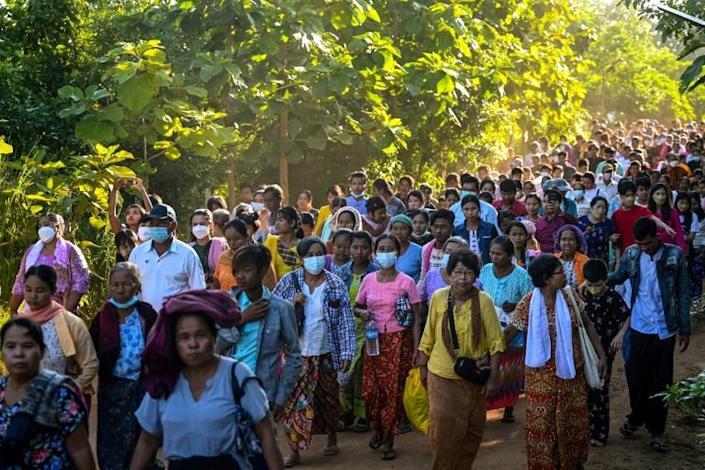
The military, which had backed the parliamentary opposition in the national election, has asserted that it staged the coup in response to electoral fraud, however the national election commission has said there is no evidence to support these claims. The NLD won around 80 per cent of the available parliamentary seats in last year’s vote.
The outgoing United Nations special envoy on Myanmar, Christine Schraner Burgener, on Monday warned that the military’s takeover of Myanmar has led to armed conflict and that the international community should support the return of power to the people in a democratic manner.
“No one in the region has an interest to recognize the SAC [State Administration Council] because that would mean going towards a failed state, instability, not only in Myanmar, but also in the region,” said Schraner Burgener. (Reuters)
In July, the New York-based NGO Human Rights Watch decried the junta’s violent suppression of demonstrations and detention of protestors and critics over the previous six months, reporting that it had included acts that violated international humanitarian conventions.
“Myanmar’s junta has responded to massive popular opposition to the coup with killings, torture, and arbitrary detention of people who merely want last year’s election results to be respected and a government that reflects the popular will,” Human Rights Watch’s Asia director, Brad Adams, said in a statement. “These attacks on the population amount to crimes against humanity for which those responsible should be brought to account.” (Human Rights Watch)
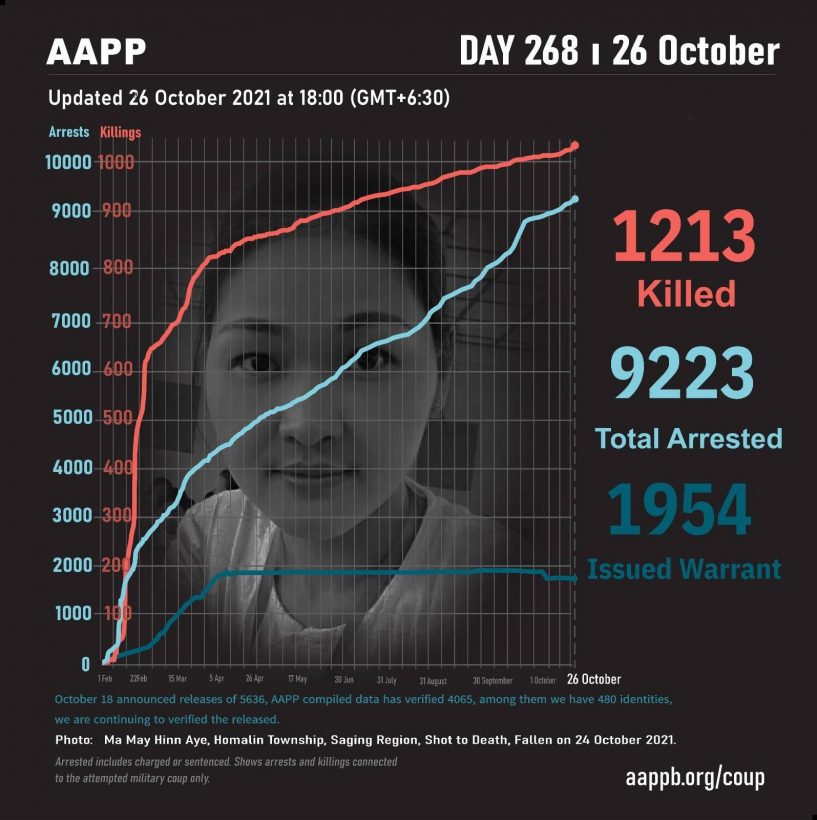
Since seizing power, the self-styled State Administration Council (SAC), led by military commander-in-chief General Min Aung Hlaing, has unilaterally amended the country’s treason and sedition legislation in an apparent bid to secure impunity for the coup leaders.
A nationwide civil disobedience movement (CDM) quickly gathered pace in the wake of the coup, with hundreds of thousands of people protesting in towns and cities across the country, denouncing the military and calling for the release of detained civilian leaders. The CDM movement, which began with medical personnel, was taken up by teachers, engineers, railway workers, bank staff, and even some members of the police force, who on some occasions were witnessed switching sides to join the protestors.
The Myanmar- and Thailand-based human rights organization Assistance Association for Political Prisoners (AAPP) reported that, as of 26 October, 1,213 people were confirmed to have been killed by the military junta. The organization noted that the figure represented only deaths that the AAPP could independently verify and that the actual number was likely much higher. A total of 7,025 people are known to be in detention, with 300 sentenced to prison terms and 65 sentenced to death—some in absentia, the AAPP said.
* Sayadaw is a title of respect for senior Buddhist monastics in Myanmar.
See more
URGENT APPEAL for Humanitarian Relief to support Buddhist Monks and Nuns in Myanmar’s Political Movement Against Military Dictatorship (International Network of Engaged Buddhists)
Monk’s reappearance brings solace in coup-hit Myanmar (Burma News International)
Daily Briefing in Relation to the Military Coup (Assistance Association for Political Prisoners)
Recognizing Myanmar junta won’t stop violence: outgoing U.N. envoy (Reuters)
Myanmar: Coup Leads to Crimes Against Humanity (Human Rights Watch)
Related news reports from Buddhistdoor Global
Myanmar Junta Drops Plan to Place Buddhist Monks on Military Roadblocks
Buddhist Monastics Targeted in Ongoing Crackdown by Myanmar’s Military Junta
Burmese Human Rights Lawyer U Nay Min Dies of COVID-19, Aged 75
UPDATE: Socially Engaged Buddhist Groups Deliver Medical Relief to Pro-democracy Protestors in Myanmar
Pro-democracy Protesters Hold Silent Strikes During Myanmar’s Buddhist New Year Holiday
Buddhist Monks in Sri Lanka Pray for the Victims of Military Coup in Myanmar as Death Toll Rises
Jogye Order of Korean Buddhism Condemns Myanmar Military in Solidarity with Pro-Democracy Movement
Senior Buddhist Monks Urge Military Junta to End Violence in Myanmar
Buddhist Monks March in Opposition to Military Coup in Myanmar
UPDATE: INEB Calls for Reconciliation in Myanmar as Pro-democracy Protests Turn Violent|
Peace Sangha Union Issues Statement on Myanmar Coup as Buddhist Monks Join Pro-democracy Protests
Related features from Buddhistdoor Global
Myanmar: A Month into the Coup
The Other Shoe Drops: Reflections on Myanmar’s Latest Coup
A Reflection on the Intellectual and Socio-Cultural History of Buddhism in Myanmar
Sea of Suffering: The Rohingya and the Conundrum of Buddhist Terror
Buddhistdoor View: Reconciling Nationalism and Buddhism









